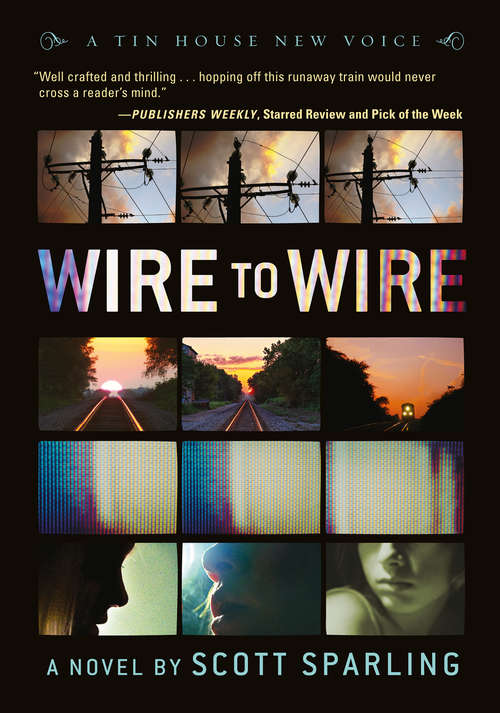Wire to Wire
By:
- Synopsis
- Wire to Wire assembles a cast of train-hopping, drug-dealing, glue-huffing lowlifes, tells a harrowing tale of friendship and loss, and creates a stunning portrait of Northern Michigan in the late 1970s.While riding a freight car through Detroit, Michael Slater suffers a near-fatal accident-a power line to the head. After recovering, he tries to lead a quiet life in the desert, but his problems just follow him. Slater returns to his native Michigan to seek out his old train-hopping pal, only to find that the Pleasant Peninsula of his youth is none too pleasant. Before long he finds his way into a love triangle, gets caught in the schemes of the resident drug lord, and manages to end up on the wrong side of everyone and everything in the small town of Wolverine. When the violent sociopath Slater left to die in the desert tracks him down, the chance of getting out of this hell unscathed starts to look slim.Three years later, Slater sits in a dark video-editing suite, popping speed like penny candy, trying to reconcile himself with the unfilmed memories that haunt his screens and his conscience.Scott Sparling's debut novel, with echoes of Robert Stone and Denis Johnson, pays homage to one of our most popular and enduring genres-the American crime novel.
- Copyright:
- 2011
Book Details
- Book Quality:
- Publisher Quality
- ISBN-13:
- 9781935639060
- Related ISBNs:
- 9781935639053
- Publisher:
- Tin House Books, LLC
- Date of Addition:
- 04/05/14
- Copyrighted By:
- Scott Sparling
- Adult content:
- No
- Language:
- English
- Has Image Descriptions:
- No
- Categories:
- Literature and Fiction
- Submitted By:
- Bookshare Staff
- Usage Restrictions:
- This is a copyrighted book.
Reviews
5 out of 5
By Kyle Massey on Aug 27, 2014
I read some review of this book that classified it as a "rural noir," and it does have those elements: a withering country landscape, lots of aimless, dead-end lives, and a main character on the run from somebody who wants to kill him. But all that is in the past, and we look back on it through prolonged flashbacks, Michael Slater's "present" being New York City circa 1981. He works as a video editor thanks to his uncanny visual acuity (the result of a close encounter with a live powerline). But his circuits have been somewhat fried in the same accident, and he keeps seeing flashbacks of his former life in Michigan, and it is there the real story takes place. Like a lot of noir, the true theme is loneliness and lack of choices, both of which play a big part in everyone's actions. So, you've got Slater, the brain-scrambled former trainhopper; his free-spirited old buddy Harp, who still likes to ride freight; Harp's girlfriend, the glue-sniffing Lane; and Lane's drug-dealing brother Charlie, who has all kinds of harebrained ideas and more than one shocking secret. All of these flawed characters (and a few more) collide against a depressed northern backdrop where what few jobs exist are low-paying and mind-numbing. Sounds like a real bummer, right? It can be, but there's a vein of humor running through it, from Charlie's numerous dumb ideas, to what brought about the death of his and Lane's father, to Harp's odd-job attempt to put a new roof on his old high-school guidance counselor's barn. There's also an exquisite sadness, though, as we see everyone's life falling into disrepair at varying speeds. There's plenty of violence, some of it pretty grisly, but it's never over-the-top, slasher-movie gore either, which makes it all the more disturbing. It's a fantastic story, both of the characters, and on a larger scale, of a rural area sinking into postindustrial decay, peppered with vivid depictions of train-jumping that are alien to most of us. One important note: pay attention to page 98, the scene on the docks in Superior, Wisconsin. It's a very brief scene, easily forgotten, but is vital to understanding what happens almost 300 pages later at the end of the book.
